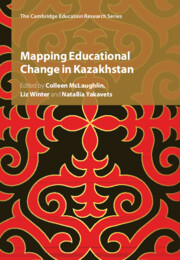Book contents
- Mapping Educational Change in Kazakhstan
- Mapping Educational Change in Kazakhstan
- Copyright page
- Dedication
- Contents
- Figures
- Tables
- Contributors
- Preface
- Acknowledgements
- Introduction
- Part I Foundations of Scaling Up
- Part II Piloting Initiatives and Scaling Up to the Whole System
- Part III Evidence of Implementation
- 12 The Aims and Methods of Evidence Collection
- 13 Regional Case Study 1
- 14 Regional Case Study 2
- 15 Regional Case Study 3
- 16 Beyond Piloting
- Conclusions
- Select Bibliography: School-Level Educational Reforms in Kazakhstan, 2011–2022
- Index
- References
16 - Beyond Piloting
A Reflection on Coherence and Systemic Implementation
from Part III - Evidence of Implementation
Published online by Cambridge University Press: 09 November 2023
- Mapping Educational Change in Kazakhstan
- Mapping Educational Change in Kazakhstan
- Copyright page
- Dedication
- Contents
- Figures
- Tables
- Contributors
- Preface
- Acknowledgements
- Introduction
- Part I Foundations of Scaling Up
- Part II Piloting Initiatives and Scaling Up to the Whole System
- Part III Evidence of Implementation
- 12 The Aims and Methods of Evidence Collection
- 13 Regional Case Study 1
- 14 Regional Case Study 2
- 15 Regional Case Study 3
- 16 Beyond Piloting
- Conclusions
- Select Bibliography: School-Level Educational Reforms in Kazakhstan, 2011–2022
- Index
- References
Summary
The aim of Chapter 16, written by researchers from the University of Cambridge and Nazarbayev University, is to ask: how coherent was implementation of the Renewed Content of Education? It bridges the gap between piloting and national implementation to report and analyse the experiences found in both pilot and non-pilot schools as reform took place at two longitudinal points: two and three years after implementation. Additionally, it reports on the third-year implementation experiences found in the district and regional layers of administration that sit above schools. In essence, it considers coherence across the entire school system as framed by the experiences of, and communications and interactions between, schools, districts and regional stakeholders.
- Type
- Chapter
- Information
- Mapping Educational Change in Kazakhstan , pp. 281 - 296Publisher: Cambridge University PressPrint publication year: 2023



